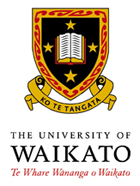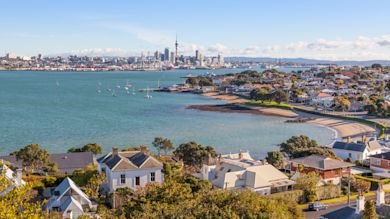Studying in New Zealand is increasingly becoming an ideal option thanks to the top-quality education, safe living environment, and holistic development opportunities for international students. The education system here is modern, focusing on critical thinking and applicability, helping students confidently enter the global labor market.
New Zealand qualifications are widely recognized around the world, opening up many career opportunities in developed countries. In addition, tuition fees and living expenses are more reasonable than those in the US, UK or Australia, making it easier for many young people to realize their dreams of studying abroad.
So, what's so special about studying in New Zealand? What are the conditions for studying abroad, tuition fees and job opportunities after graduation? Let's explore the details in the article below to have a comprehensive view before starting your journey to study in New Zealand!
1. Why should you study in New Zealand?
1.1. Universities in the top 3% of the world
The educational method in New Zealand emphasizes critical thinking, creativity and initiative. Students not only learn theory but also practice, participate in practical projects to develop professional skills.
All 8 universities in New Zealand are in the top 3% of the world, giving degrees global recognition and creating a competitive advantage in the international job market.
See also: Top Universities in New Zealand
1.2. Numerous work opportunities during study and after graduation
From 2025, international students will be allowed to work 20–25 hours per week during the semester and full-time during the holidays, helping to reduce the financial burden and gain practical experience.
After graduation, you can continue to work for 1–3 years depending on the level of study (Bachelor – PhD). Particularly at the doctoral level, students can sponsor their families to accompany them and enjoy many attractive immigration incentives.
1.3. Many attractive scholarships to study in New Zealand
Universities in New Zealand always have attractive scholarships depending on the level of study and field you choose. To find out more about the scholarships available to study in New Zealand in 2026, contact IDP now or apply below for detailed advice.
2. Conditions for studying in New Zealand
Depending on the level of study, program and requirements of each school, the conditions for studying in New Zealand may vary. However, international students typically need to meet the following general criteria:
2.1. Educational conditions
High school: Completion of grades 10–12 (equivalent to NCEA Levels 1–3).
College/University: Graduated from high school; Some majors require minimum grades or required coursework.
Postgraduate / Master / PhD: Graduated from the university in the right major, GPA as required by each school.
Reference GPA:
Undergraduate: ~6.0 or higher (depending on the school)
Graduate: 6.5–7.0 or higher
2.2 English language requirements
Students need to meet the English language requirements for each level of study.
Level of Education | IELTS (minimum) |
High School | 5.0–5.5 |
College | 5.5 |
University | 6.0 |
Postgraduate | 6.5 |
Note: Some majors such as Medicine, Education, Health may require higher scores.
2.3. Financial conditions
Students need to demonstrate sufficient funds to cover tuition fees and living expenses for the duration of their studies in New Zealand. According to visa regulations, the minimum required living allowance is NZD 20,000/year; In addition, depending on the program and the city of study, the actual cost may be higher. Proof of finances usually includes bank statements, property documents, proof of income, or equivalent documents to ensure you can afford to pay in full during your studies.
3. How much does it cost to study in New Zealand?
The cost of studying in New Zealand ranges from 600 million to 1.5 billion VND/year, depending on the major, level of study, city of residence and spending style. Compared to English-speaking countries such as the US, UK or Australia, the cost of studying in New Zealand is considered more affordable and accessible.
Below is an overview of tuition fees, housing costs, and living expenses when studying in New Zealand.
3.1. Tuition fees to study in New Zealand
Tuition fees to study in New Zealand vary depending on the level of study and training program. The reference fee is as follows:
Level of Education | Estimated Tuition | Estimated VND |
English | 499 – 548 NZD/week | ~ 7.5 – 8.3 million VND/week |
High School | 19,500 – 45,000 NZD/year | ~ 296 – 683 million VND/year |
Pre-University | 25,080 – 31,250 NZD/year | ~ 381 – 474 million VND/year |
College | 30,096 – 39,800 NZD/year | ~ 456 – 604 million VND/year |
University | 29,425 – 55,247 NZD/year | ~ 446 – 838 million VND/year |
Postgraduate | 34,650 – 53,030 NZD/year | ~ 526 – 804 million VND/year |
Note:
Estimated tuition fee in VND, using exchange rate ~ 1 NZD ≈ 14,780 VND
Tuition fees may vary by field of study. For the latest rate updates, please contact IDP.
For more: How much money do you need to study in New Zealand?
3.2. Housing Costs in New Zealand
The cost of housing is an important factor in the total cost of studying in New Zealand. The price depends on the type of accommodation, location, and accompanying facilities.
Type of accommodation | Estimated cost (NZD/week) | Estimated VND/week |
Dormitory | 200 – 400 NZD | ~ 3 – 6 million VND |
Homestay | 280 – 340 NZD | ~ 4.1 – 5 million VND |
Renting a private house | 200 – 500+ NZD | ~ 3 – 7.5 million VND |
Estimated tuition fee in VND, Reference rate: 1 NZD ≈ 14,780 VND
3.3. Cost of living in New Zealand
In addition to tuition and housing, students need to consider living expenses such as food, transportation, and entertainment,...
Type of accommodation | Estimated cost (NZD/week) | Estimated VND/week |
Dormitory | 200 – 400 NZD | ~ 2.956.060 – 5.912.120 VND |
Homestay | 280 – 340 NZD | ~ 4.138.484 – 5.025.302 VND |
Renting a private house | 200 – 500+ NZD | ~ 2,956,060 – 7,390,150+ VND |
Below is a table of living expenses for studying in New Zealand converted to VND at the exchange rate of 1 NZD ≈ 14,780.3 VND
4. New Zealand Education System
The education system in New Zealand is highly regarded for its flexibility, emphasis on developing the thinking and creativity of learners. The entire system is divided into three main levels:
4.1 Early Childhood Education (ECE)
The ECE program is for children from birth to about 5 years of age.
Although not mandatory, the majority of children in New Zealand participate to develop social, emotional, communication and exploratory thinking skills.
This is considered a solid foundation for children to be confident and achieve better results when entering the next levels of education.
4.2 Primary and Secondary Education
The general education system in New Zealand consists of 13 years of study, divided into two main stages:
Primary School: From Year 1 – Year 8, for students from 5–12 years old.
Secondary School: From Year 9 – Year 13, for students aged 13–17.
During their final years (Years 11–13), students will take competency assessments and be awarded the National Certificate of Educational Achievement (NCEA) at various levels. NCEA is a nationally recognized high school diploma and is accepted by many countries around the world.
4.3 Tertiary Education
Post-secondary education in New Zealand is very diverse, making it easy for international students to choose the right career.
1) Universities
New Zealand has 8 public universities, which are globally renowned for the quality of training and research. Schools offer training from bachelor's to doctorate, with many strong disciplines such as:
Business Administration
IT & Computer Science
Technique
Medical, nursing
Education
2) Institute of Technology & Polytechnic
The Te Pūkenga network brings together 16 public institutes and vocational training institutions, offering a hands-on curriculum that helps students adapt to the labor market early.
5. Top Universities in New Zealand
Here is a list of the Top Universities in New Zealand in 2026 (QS World University Rankings 2026):
Field | World Ranking |
University of Auckland | #65 |
University of Otago | #197 |
Massey University | #230 |
Victoria University of Wellington | #240 |
University of Waikato | #281 |
Lincoln University | #407 |
Anonymous | #410 |
Source: https://www.topuniversities.com/world-university-rankings
6. Scholarships to study in New Zealand?
The majority of scholarships to study in New Zealand are currently offered by Universities and educational institutions. Depending on your level of study and academic achievement, you can receive a partial scholarship with a value of NZD $2,000 – $35,000.
Scholarships are usually considered based on:
Academic Achievement (GPA)
Extracurricular Activities
Special Achievements
English Language Requirements (IELTS/TOEFL)
Field | Name of Scholarship | Level of Education | Value |
University of Otago | University of Otago Pathway Scholarships | Foundation | NZD $5,000 |
Waikato College | Early Bird Pathway | Foundation | NZD $2,000 |
University of Otago | Otago Undergraduate Entrance Scholarship | UG | NZD $10,000 – $35,000 |
Lincoln University | International School Leavers Scholarship | UG | NZD $10,000 |
University of Otago | Vice-Chancellor's Scholarship | UG | NZD $10,000 |
University of Otago | Otago Global Scholarships | UG | NZD $15,000 |
University of Waikato | Vice-Chancellor's International Excellence Scholarship | UG/PG | Up to NZD $15,000 |
University of Auckland | International Student Excellence Scholarship | UG/PG/PGD | Up to NZD $10,000 |
University of Auckland | ASEAN High Achievers Scholarship | UG/PG/PGDip | Up to NZD $10,000 |
Note: Scholarship information is subject to change from year to year. Contact IDP for the latest list of scholarships to study in New Zealand here.
7. What should I study in New Zealand?
When studying in New Zealand, choosing industries with high human resource demand will help you increase your chances of long-term work and settlement. Some prominent industries include:
Information Technology (IT)
Medical – Nursing
Engineering & Technology
Science
See more: 8 Easy Majors to Get a Job and Settle in New Zealand
IDP offers free study abroad advice and scholarship hunting in New Zealand!
New Zealand is a world leader in the Future Education Index, renowned for its high-class education system and safe, modern learning environment. If you are looking for the optimal and economical route to study in New Zealand, the IDP team of experts is ready to accompany you.
IDP supports connecting with prestigious partner schools in New Zealand, advising on choosing the right major and course, guidance on hunting for scholarships to study in New Zealand, preparing documents and applying for a New Zealand student visa with a success rate of over 95%.
You can also participate in Study Abroad Days and events organised by IDP to meet the university representative in person and review your application on-site. In addition, the IDP Live app with the Fastlane feature helps track progress and receive admission offers 2-3 times faster.
Contact IDP or book an online consultation to start your journey to study in New Zealand today!
Read more
Explore in New Zealand
Hover over the city cards to discover more!

Send funds securely with money transfer
Explore safe, convenient and fast payment solutions with our market leading partners.

Find your home away from home
We’ll help you discover student accommodation that makes you feel comfortable and at home, no matter where you are.
Cost of living calculator
Estimate how much you will need to cover your expenses including cost of living comparison for various country and accommodation options.
Can’t decide where to study?
Answer 5 quick questions to get personalised content and course recommendations


















